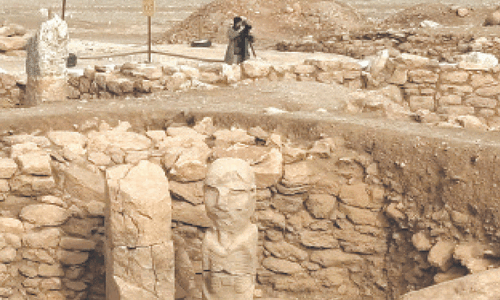RAMALLAH: Palestinian factions signed a reconciliation deal in Algiers on Thursday, vowing to hold elections by next October in their latest attempt to end a rift that has now lasted more than 15 years.
The deal was signed by a leading figure from the Fatah party of President Mahmud Abbas and by the chief of Islamist movement Hamas, which rules Gaza.
The two rival groups have been at odds for more than a decade.
While Fatah dominates the internationally recognised Palestinian Authority (PA), which is based in the West Bank, Hamas is in control in the Gaza Strip.
Here is a look back at the history of the dispute:
2006: Islamists win at the polls
In 2006, Hamas takes part in elections to the Palestinian parliament for the first time, sweeping to a landslide victory over Palestinian president Mahmud Abbas’s Fatah, which had dominated the assembly based in the West Bank city of Ramallah since it was established.
A unity government is installed with Hamas taking key posts but it is dogged by international demands that they renounce violence, as well as recognise Israel and past peace deals. The Islamists reject these demands.
2007: Hamas seizes Gaza
After a week of deadly street clashes in June 2007, Abbas dismisses the unity government and declares a state of emergency in Gaza.
But Hamas fighters rout pro-Abbas forces and take control, a move Abbas condemns as a coup.
2011-2014: Reconciliation stillborn
In April 2011, Fatah and Hamas say they have reached an understanding to create an interim government to prepare for elections, but implementation is repeatedly delayed.
In February 2012, the two movements agree Abbas should lead an interim government, but the deal is disputed within Hamas and never implemented.
Fatah seals a reconciliation accord with Hamas in April 2014. In June, a unity government is sworn in but fails to exercise authority over Gaza and falls apart months later.
2017: Partial reconciliation
Tensions rise over the formation by Hamas in March of an “administrative committee” in Gaza, which is seen as a rival Palestinian government.
Abbas puts the squeeze on Hamas including by cutting payments for electricity supplies and civil servants’ salaries in Gaza. In May, Hamas issues a new policy document, easing parts of its stance on Israel. In September, it dissolves the administrative committee.
On October 12, the two sides announce they have reached a new reconciliation deal in Cairo under which Hamas agrees to cede power in the Gaza Strip to Abbas’s Palestinian Authority. Hamas hands over control of Gaza’s borders to the PA on November 1.
But the two sides remain sharply at odds over the police in the Gaza Strip and the future of Hamas’s armed wing, with Hamas refusing to lay down arms.
2018-2019: Bombs and borders
On March 13, 2018, then Palestinian prime minister Rami Hamdallah survives a bomb attack on his convoy during a rare visit to Gaza.
Abbas accuses Hamas of plotting the attack and announces sanctions against the movement. Hamas rejects all blame.
In January 2019, the PA says it is withdrawing staff from the Rafah border post with Egypt in the southern Gaza Strip to protest “brutal practices” by Hamas.
In February, Hamas takes control of the Palestinian side of the enclave’s main goods crossing with Israel. On April 14, prime minister Mohammed Shtayyeh forms a new government that excludes Hamas. On September 24, Hamas and Fatah agree to hold Palestinian elections within six months.
2021: Elections delayed
In April 2021, Abbas calls off the first planned elections in nearly 15 years, citing a lack of guarantees from Israel that it would allow Palestinians in annexed east Jerusalem to take part in the vote.
Hamas slams the postponement as a “coup” by Abbas.
In December, Algerian President Abdelmadjid Tebboune hosts a visit by Abbas to Algiers and launches an initiative intended to promote a Fatah-Hamas reconciliation.
2022: Executions, arrests, signing
On September 4, 2022, Hamas announces that it has executed, for the first time since 2017, five Palestinians, including two for “collaboration” with Israel.
Deadly clashes erupt in the West Bank later the same month after the PA in a rare operation arrests a young Hamas member, Musaab Shtayyeh.
On October 13, Hamas and Fatah sign a deal in Algiers vowing to hold elections by next October in their latest attempt to end the rift.
Published in Dawn, October 15th, 2022

































